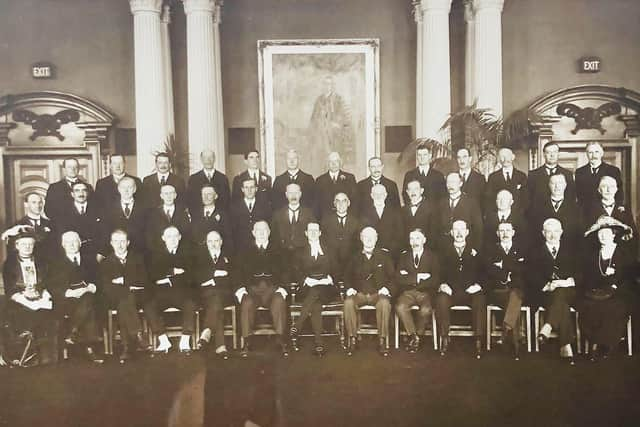Alex Kane: Lots of questions, but no easy answers for unionism


The 40 unionist MPs (the 12 nationalist seats remained empty because their MPs refused to take the oath of loyalty to the crown) confirmed Sir James Craig as prime minister (he had already been appointed to the role earlier that morning by the lord lieutenant), elected a speaker, took their oath of office and then elected members to the Senate.
In today’s Assembly there are still 40 unionist members, although they now represent a minority of MLAs and are spread over the DUP, UUP, TUV and the independent unionist Claire Sugden There is a second border to worry them. Demographics have narrowed quite dramatically and the electoral margin between party-political unionism and party-political nationalism continues to close.
Advertisement
Hide AdAdvertisement
Hide AdGiven the row over the protocol there is no certainty the Assembly will survive much longer: meaning some weird form of direct rule under Boris Johnson’s ersatz approach to unionism and the union. And with the implosion of the DUP doing more internal damage by the day the next election could see, as Peter Robinson noted in a recent News Letter column, the appointment of a Sinn Fein first minister and justice minister, too.


In 1921 – indeed it can be traced back to the beginning of the Home Rule Crisis in the mid-1880s and then the creation of the Ulster Unionist Council in 1905 – the unionist mantra was ‘united we stand, divided we fall’. It was, of course, a mantra which encouraged insularity, narrowness of vision and even paranoia (to the extent that anyone who even dared to poke their heads from the iron flaps of the big tent was likely to be dismissed as a Lundy).
But the divisions came because enforced insularity and narrowness of vision will always result in schism (just look at the DUP right now). While Stormont existed it was easier to maintain one-party unity within unionism, because a mixture of patronage, promotion of electoral fears and very tight control at local constituency level made it difficult for new vehicles to emerge.
That said, it didn’t always stop the occasional independent unionist or maverick from slipping through the net. And nor did it stop the huge electoral challenge to the UUP from the Northern Ireland Labour Party in the 1950s/60s, particularly in Belfast. Remarkably, in the 1962 Stormont election it was just 8,000 votes short of the total unionist vote in Belfast: a result which some historians argue increased the argument for the removal of Basil Brooke, who had been leader and PM for almost 20 years. He was replaced by Terence O’Neill a year later.
Advertisement
Hide AdAdvertisement
Hide AdBut by 1969, when it became apparent that O’Neill was no longer in control of the political agenda, the divisions within unionism became impossible to prevent. In the last general election to the NI Parliament in 1969 the unionist vote was split between Official Unionist (pro-O’Neill), Official Unionist (anti-O’Neill), Unofficial Unionist (anti-O’Neill), Independent Unionist and Protestant Unionist (Ian Paisley’s first vehicle). Within a few years Vanguard, DUP, West Belfast Loyalist Coalition, United Ulster Unionist Coalition and UPNI (Faulkner’s party) and a number of offshoots had joined the fray.
In the 1998 Assembly unionism was represented by the UUP, PUP, DUP, UKUP (which later produced the NIUP splinter) and the NIAP (three independent unionists who joined forces). Since then we’ve had NI21, TUV and UKIP. There’s already talk of a new vehicle emerging from the ashes of the DUP, although I think that’s unlikely before the next Assembly election. And there’s also talk of some sort of pan-unionist electoral pact to lessen the chances of Sinn Fein becoming the largest Assembly party.
Meanwhile, response to the protocol is creating new intra-unionist/loyalist tensions. I’ve asked the question before, but I’m going to ask it again: how far would a section of unionism/loyalism go to get rid of the protocol? Or, another question, how far would a section of unionism/loyalism go to ensure the Assembly survives and direct rule is avoided?
Both of those questions are being asked within and across unionism/loyalism and I have to tell you that I genuinely don’t know which side of the debate will win. But I do know that the outcome will, inevitably, be yet another schism within the pro-Union community. And here’s the ultimate conundrum, of course, in terms of the choice for unionism: it’s either support the retention of an Assembly in which a key party (with a significant veto available to it) has no interest in Northern Ireland; or push for direct rule and trusting their fate to Westminster. That’s not much of a choice for unionism to face in its centenary year.
Advertisement
Hide AdAdvertisement
Hide AdHere’s another unanswered question: how does unionism maximise the overall pro-Union vote, while making the strongest possible case to Westminster and the wider GB base for NI remaining in the UK? I’ve argued before for the creation of a broad council for the union which encompasses the entirety of the existing pro-Union community (which is a very diverse family, by the way, many of whom have no formal connection to party-political unionism) to see if it is possible to agree collective themes, messages, values, beliefs and strategies).
Fighting a battle for survival on 30 different fronts, with 30 different strategies and 60 different would-be commanders will only lead to greater internal, intra unionist/loyalist/pro-Union warfare. If it isn’t sorted well in advance of a border poll (which will come) it will be too late to sort it.
I’m sick to death of Grand Old Duke of York tactics built on 1690 dynamics.
——— ———
A message from the Editor:
Thank you for reading this story on our website. While I have your attention, I also have an important request to make of you.
Advertisement
Hide AdAdvertisement
Hide AdWith the coronavirus lockdown having a major impact on many of our advertisers — and consequently the revenue we receive — we are more reliant than ever on you taking out a digital subscription.
Subscribe to newsletter.co.uk and enjoy unlimited access to the best Northern Ireland and UK news and information online and on our app. With a digital subscription, you can read more than 5 articles, see fewer ads, enjoy faster load times, and get access to exclusive newsletters and content. Visit https://www.newsletter.co.uk/subscriptions now to sign up.
Our journalism costs money and we rely on advertising, print and digital revenues to help to support them. By supporting us, we are able to support you in providing trusted, fact-checked content for this website.
Alistair Bushe
Editor